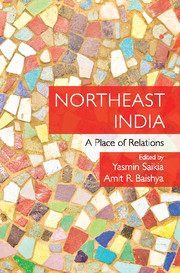Book contents
- Frontmatter
- Contents
- List of Figures
- List of Boxes
- List of Tables
- Acknowledgments
- Introduction
- Section I Contemporary Politics and Issues of Definition
- Section II Creating Presence
- Section III Knowing through Experience
- Section IV Rethinking Politics
- 10 Difficult Loves: Purity and Hardship
- 11 Politics of Difference in the Northeast: A Feminist Reflection
- 12 Robes, Rivers and Ruptured Spaces: Hydropower Projects in West Arunachal Pradesh
- Glossary
- About the Contributors
- Index
10 - Difficult Loves: Purity and Hardship
from Section IV - Rethinking Politics
Published online by Cambridge University Press: 23 July 2017
- Frontmatter
- Contents
- List of Figures
- List of Boxes
- List of Tables
- Acknowledgments
- Introduction
- Section I Contemporary Politics and Issues of Definition
- Section II Creating Presence
- Section III Knowing through Experience
- Section IV Rethinking Politics
- 10 Difficult Loves: Purity and Hardship
- 11 Politics of Difference in the Northeast: A Feminist Reflection
- 12 Robes, Rivers and Ruptured Spaces: Hydropower Projects in West Arunachal Pradesh
- Glossary
- About the Contributors
- Index
Summary
I know how to walk the walk
I know how to talk the talk
But when it comes to Anguish
The language I cry in
Gives me away
– Senti Toy, The Language I Cry (2005)Introduction
Often the relationship between citizens and the state is perceived through the lens of governance and regulation (Chatterjee, 2004; Gupta, 1995; Sivaramakrishnan and Agrawal, 1997). It was certainly my intent to see the state in this way. I arrived in the foothill border of Assam and Nagaland to pursue an ethnographic study about state violence and resource conflicts. However, I realized that accounts from the foothill border increasingly took the form of narratives of a very specific type. One of the most popular expressions in which foothill residents told their stories was by invoking morom, a broad term for love and affection in Nagamese, the lingua franca spoken in the foothills of Assam and Nagaland.
Morom captures multiple emotions and relations, and is not limited to romantic love or affection. It refers to relations of patronage between servant and master; bonding between friends; attachment and care between parents and children as well as the relationship between the state and the public, or lust, attraction and adoration between lovers. In addition, mercy, gratitude, sympathy, grace, compassion and charity are all encompassed as acts of morom. I met lovers and spouses who shared stories of abuse and violence, but layered their tortured lives in the language of sacrifice, and came across names of places and landmarks identified as sites of love.
What is distinct about the expressions of morom is the manner in which all kinds of attachments and affections are incorporated. Expressions for lust and physical attractions are categorized as ‘bhal’ or ‘good/like,’ which is also used to express desire for inanimate objects like clothes or sensory tastes pertaining to movies and food. Sexual intercourse is expressed as ‘bia kam/letera kam’ or ‘ bad activity/dirty activity.’ The same expressions are used to describe rape and violation since there is no word for ‘rape’ or sexual abuse in Nagamese. My point here is to emphasize how morom is not isomorphic with the English word love but resonates with everyday articulations and declarations of affections.
- Type
- Chapter
- Information
- Northeast IndiaA Place of Relations, pp. 225 - 243Publisher: Cambridge University PressPrint publication year: 2017
- 1
- Cited by

